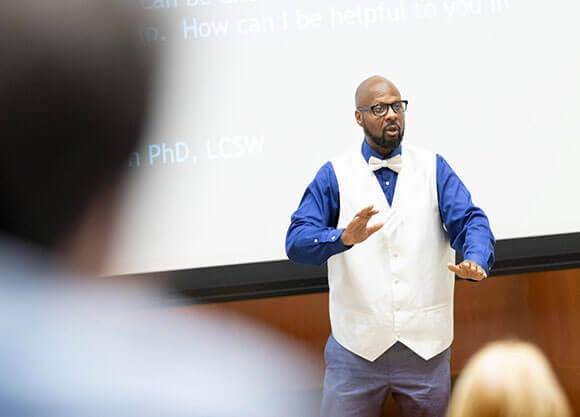
Fighting the opioid crisis with innovation, compassion
June 12, 2019

June 12, 2019

After years of drug-related arrests, Gorham was wanted by the New Haven Police Department. Again.
“I could hear the cops telling her that I was armed and dangerous, and that I needed to turn myself in,” Gorham said. “I remember her leaving the house — I don’t know if she knew I was there or not — and then going upstairs thinking, ‘Do I want to live, or do I want to die?’”
Gorham, now a clinical case manager at the McCall Center for Behavioral Health in Torrington, Connecticut, chose to live that day. At the top of the stairs, he found some clean clothes, a plate of food and $20 on the kitchen table — a mother’s care package for a second chance.
With that, Gorham turned himself in to police, served four years in state prison and got clean. Today, he helps those battling opioid use disorder and other issues. There is no judgment here, only a story of hope from someone who made it back from the basement.
Gorham shared his story recently at the Quinnipiac School of Law before about 100 people at a summit titled, “Building Bridges and Finding Answers: The Opioid Crisis in Connecticut.” This was the second part of a seven-month examination of the opioid epidemic sweeping the state and the nation.
Quinnipiac partnered with the Connecticut Bar Association and the Connecticut Bar Foundation from November to June to come up with bold, thoughtful ways to help people with opioid use disorder. The schools of law, medicine, education, health sciences and nursing were involved in the forum.
On June 7, nine work groups presented their findings and strategies for fighting the crisis, an especially lethal problem in Connecticut. In 2017, for example, there were 1,038 accidental drug deaths, mostly from opioids, according to the state Office of the Chief Medical Examiner.
“This is a problem that doesn’t discriminate,” said Jeanne Milstein, director of human services for the city of New London, and co-chair of the group that examined the municipal response.
To illustrate her point, Milstein said seven people died of drug overdoses in Hartford during the first week of June. Seven people. One week. No excuses. The numbers were as numbing as they were tragic.
Julia Scharnberg, another member of the work group that examined the regional response, said Connecticut’s longstanding tradition of 169 autonomous cities and towns often inhibits an integrated response.
“We won’t succeed with 169 different plans around the state,” said Scharnberg, grants and program director of the Northwest Connecticut Community Foundation.
Other work groups, including one exploring people in recovery/treatment providers and another studying employers/business, discussed the importance of communication and humanity.
For example, something as simple as a face-to-face conversation, or even showing concern and offering to listen, can help someone who might feel lonely and lost.
Overall, the summit’s work groups brought together statewide experts representing law, medicine, public policy, social services, politics, education, nursing, law enforcement, EMS, treatment and options. They all came to create connections, exchange resources and collaborate on solutions.
The Quinnipiac University Law Review plans to publish a collection of short stories about the strategies and recommendations developed over the last seven months.
Quinnipiac Today is your source for what's happening throughout #BobcatNation. Sign up for our weekly email newsletter to be among the first to know about news, events and members of our Bobcat family who are making a positive difference in our world.
Sign Up Now